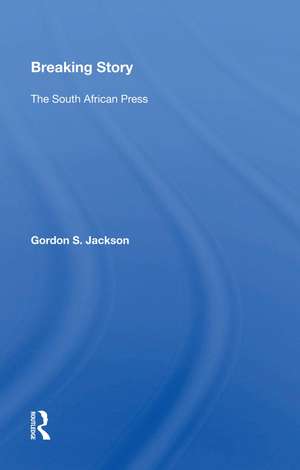Breaking Story: The South African Press
Autor Gordon S. Jacksonen Limba Engleză Hardback – 9 apr 2020
| Toate formatele și edițiile | Preț | Express |
|---|---|---|
| Paperback (1) | 298.02 lei 6-8 săpt. | |
| Taylor & Francis – 31 oct 2022 | 298.02 lei 6-8 săpt. | |
| Hardback (1) | 769.90 lei 6-8 săpt. | |
| Taylor & Francis – 9 apr 2020 | 769.90 lei 6-8 săpt. |
Preț: 769.90 lei
Preț vechi: 1030.77 lei
-25% Nou
Puncte Express: 1155
Preț estimativ în valută:
147.33€ • 157.54$ • 122.83£
147.33€ • 157.54$ • 122.83£
Carte tipărită la comandă
Livrare economică 17 aprilie-01 mai
Preluare comenzi: 021 569.72.76
Specificații
ISBN-13: 9780367011468
ISBN-10: 0367011468
Pagini: 332
Dimensiuni: 146 x 229 mm
Greutate: 0.77 kg
Ediția:1
Editura: Taylor & Francis
Colecția Routledge
Locul publicării:Oxford, United Kingdom
ISBN-10: 0367011468
Pagini: 332
Dimensiuni: 146 x 229 mm
Greutate: 0.77 kg
Ediția:1
Editura: Taylor & Francis
Colecția Routledge
Locul publicării:Oxford, United Kingdom
Cuprins
Preface -- Roots -- The Freeze, the Thaw, and the Future -- The Backdrop -- The Alternative Press -- The Realities of the Marketplace -- The Law -- The State of Emergency -- Other Environmental Hazards -- Prospects -- The Prospects for Press Freedom -- Other Vital Issues -- Rewriting the Map -- Appendix
Descriere
A comprehensive review of the press in South Africa since 1976—the year the Soweto riots triggered nationwide protests against white domination—this book examines the role the press has played in reflecting and shaping both apartheid and its undoing. Beginning with a survey of the social and political changes occurring during the period, Gordon Jackson goes on to examine the overall structure of the newspaper industry in South Africa. Jackson offers an in-depth analysis of the economic difficulties facing journalism, including the impact of television's increasing share of the advertising market. He gives special attention to the alternative press, which arose in the mid-1980s at the height of the government's crackdown on dissent, and explores the origins and impacts of regulations imposed under the State of Emergency, in effect from 1985 to 1990, which included massive restrictions on the media. In closing, Jackson considers how the press confronted obstacles in order to survive in a political climate that brought freedom of the press to the brink of extinction and looks at how the press is changing now that the South African government itself has rejected apartheid. He concludes by examining the forces favoring the success of a free press under a black majority government and assessing the desirability of a national media policy
